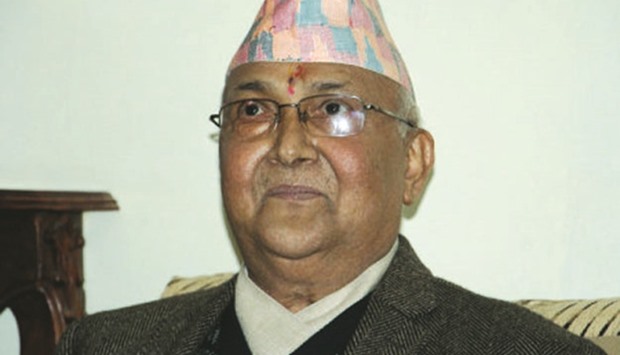Nepal’s prime minister will travel to India next week on a visit aimed at repairing fractured relations between the neighbours after the end of a crippling months-long border blockade,
Kathmandu said yesterday.
Demonstrators in Nepal had obstructed a major trade route since September in protest at a new constitution, sparking debilitating shortages of fuel and other vital supplies across the landlocked Himalayan
nation.
But slow movement of cargo across other checkpoints where no protests were taking place prompted Kathmandu to accuse New Delhi, which has criticised the constitution, of imposing an “unofficial blockade”, a charge India denied.
The strained ties meant that K P Sharma Oli, who became premier in October, put off visiting India — a traditional first stop for Nepali prime ministers heading overseas — until the blockade ended last week.
“Prime Minister Oli is now in a position to improve the souring relationship with India after the promulgation of the new constitution in Nepal,” said the prime minister’s foreign affairs adviser Gopal Khanal.
“He hopes to end any confusion in bilateral ties that has emerged in recent times,” he said.
More than 50 people have died in clashes between police and protesters from southern Nepal’s Madhesi ethnic minority and share close cultural, linguistic and family links with Indians living across the border.
The unrest has triggered concern in India, with New Delhi urging Kathmandu to hold talks with the Madhesis, who say the charter, adopted in September, leaves them
politically marginalised.
India’s foreign ministry spokesman Vikas Swarup told reporters the visit was “expected to lead to a further strengthening of our age old, close and friendly relations with Nepal”.
Slated for discussion were developmental assistance, energy and connectivity, he said, as well as the resumption of commerce across the formerly blocked checkpoint.
Lok Raj Baral, a former Nepali ambassador to India said that establishing a good rapport with Prime Minister Narendra Modi would be vital for Nepal’s new prime minister on the visit, slated for February 19-24.
The small country is heavily dependent on India for fuel and other supplies.
“Nepal has serious limitations because of its geography so our leaders need to be realistic instead of chanting nationalistic slogans,” Baral said.
“Meanwhile India needs to realise that it cannot dictate terms to a sovereign country and micromanage its political affairs,” he said.
The constitution, the first drawn up by elected representatives, was meant to cement peace and bolster Nepal’s transformation to a democratic republic after decades of political instability and a 10-year Maoist insurgency.
But ongoing discussions between the government and protesting parties over the charter have failed to yield an agreement.

K P Sharma Oli ... hoping to end any confusion in bilateral ties
